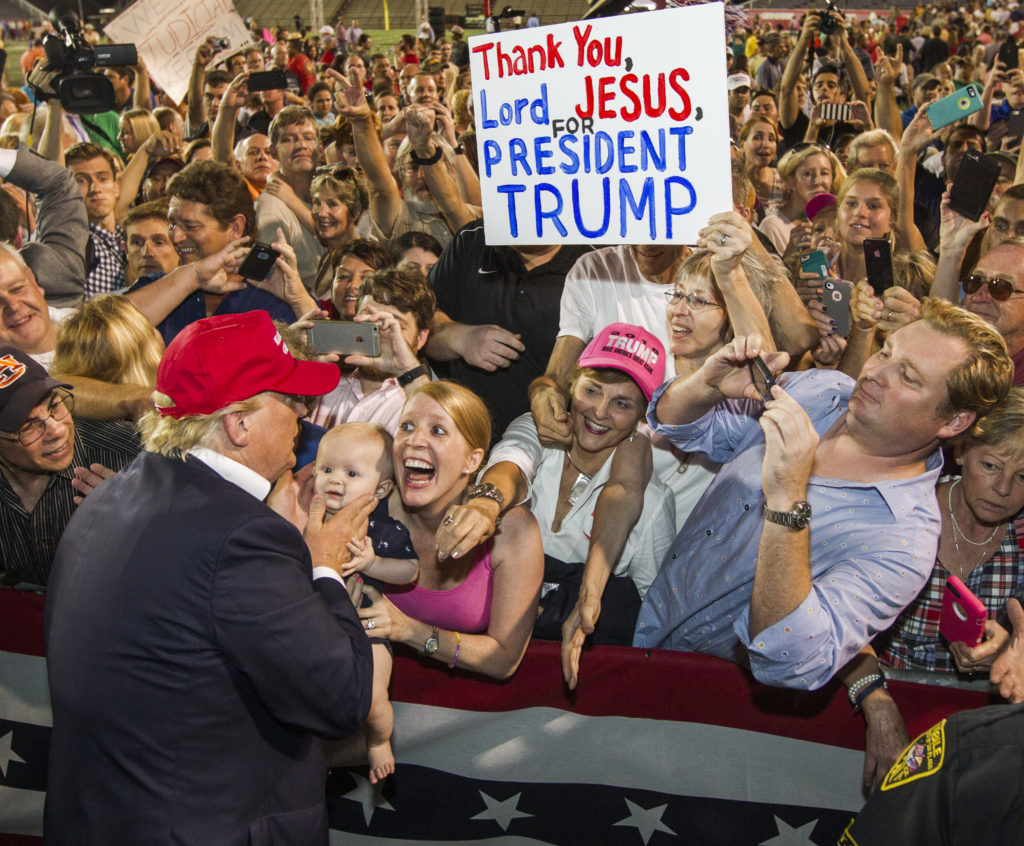Will Trumpism Force Evangelicals To Reckon With Their Values?

The answer is that of course it won’t. The announcement of Beth Moore, one of the most popular white female evangelicals in the nation, that she was leaving the Southern Baptist Convention over its terrible values and politics. The problem, as Audrey Clare Farley points out, is that white evangelicalism has always been a cesspool of hard-right racist and patriarchal misogynist politics. That’s the whole point of it, in the American context at least.
There are those, such as SBC President J.D. Greear, who insist that the problems of the evangelical community are cultural, not doctrinal; others express regret that the movement has been hijacked by politics in recent years—an idea the media seems to have tacitly accepted. Still others rightly question these framings, noting that there was never a heyday when doctrine, rather than politics, defined the movement, nor when evangelicalism was not synonymous with white patriarchal power. It is precisely because the voices of these latter critics have long been excluded from the narrative-making that so many Americans are startled, along with Moore, by the state of white evangelicalism. In order to comprehend such phenomena as the storming of the Capitol by militarized men waving Christian and Confederate flags, it is imperative to acknowledge the racist, sexist politics undergirding the modern evangelical movement since its foundation—history that those who have controlled the narrative have gone to some lengths to leave out.
There is a new generation of religious scholars doing such corrective history. Anthea Butler wrote her forthcoming book, White Evangelical Racism: The Politics of Morality in America, to redress what she calls the “White Savior” approach to evangelical history: The tendency of media-savvy religious leaders and “insider” academics to illuminate the noble efforts of abolitionists and other do-gooders, while giving little or no thought to evangelicalism’s more incendiary projects. Her book discusses how nineteenth-century missionaries used the gospel to control heathen (that is to say: nonwhite) others; how the SBC was founded in 1845 expressly to protect the interests of Southern slaveholders from the interference of Northern Baptists; and how Southern evangelicals valorized white femininity in order both to justify their abuse of supposedly barbarous Black men and obscure their own sexual violence against enslaved women.
Nowadays, Butler explains, purity culture allows for white evangelicals to disparage Black families who don’t adhere to the two-parent model, while, again, not applying the same moral codes to their own leaders. Butler tells The New Republic that for those who have been “born again,” no scandal is insurmountable: “Like the phoenix, they can rise out of virtually every situation because Christ died for them, but not for other unwashed, unsaved sinners.” (Theologically, white evangelicals do believe Jesus died for all, but this conviction does not always inform their actions.)
The emphasis on an emotive conversion experience—one of the four pillars of evangelicalism, according to insider historian David Bebbington—also abets the effort among white evangelicals to downplay racial injustice. Last June, when the nation was reeling from both a global pandemic and the horrific murder of George Floyd, Moore made pointed mention of this fact after SBC leaders chose that moment to fret about critical race theory. (In November, leaders formally condemned the theory.)
“The current state of American Evangelicalism is what we get when the gospel is reduced to an entrance exam,” she tweeted. The broader emphasis on spiritual, rather than earthly, salvation, too, contributes to what Jemar Tisby, in his own book about racism in Christianity, refers to as “complicit Christianity.” During Reconstruction and the civil rights era, white evangelicals emphasized the saving of souls over earthly reforms, either opposing integration outright or advocating for a more limited set of incremental (that is to say, white-friendly) reforms. The influential Reverend Billy Graham, for instance, made a point to appear aligned with the Reverend Dr. Martin Luther King Jr. and other Black faith leaders, all while obstructing their efforts toward racial harmony. His “eventually, but not now” attitude toward civil rights isn’t fully apparent in the hagiographies that many evangelicals have since produced.
The United States is becoming more secular every year. People like this are a big part of the reason. What this leaves is a smaller group of Christians who are ever more extremist. They are pretty comfortable with violence, as we saw on January 6 and see all the in this country anyway. Pointing out the Biblical contradictions here is pointless. The purpose of this kind of religion has nothing to do with anything doctrinal issues. It’s about the politics. That’s the appeal. That’s the reason it exists.


